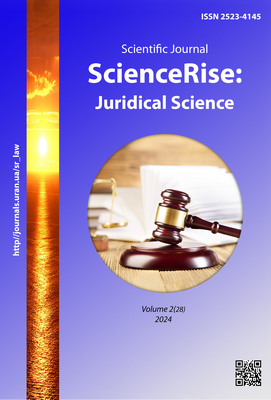Reasonableness of court decisions in the paradigm of psychological, logical and doctrinal analysis
DOI:
https://doi.org/10.15587/2523-4153.2024.307745Keywords:
court decision, reasonableness, psychology, logic, doctrine, judgment, reasoning, validity, justice, criminal procedure, fair trialAbstract
The article is devoted to the study of the concept of reasoning of court decisions through psychological, logical and doctrinal aspects. Reasonableness of court decisions is a multifaceted concept, which is influenced by the interaction of these three key aspects. Studying the characteristics of a court decision as a special type of legal document through the prism of interdisciplinary dialogue improves understanding of the processes underlying judicial thinking and the formalization of its outcome. Cognitive biases, emotional state and social pressure influence the decision-making process. The article analyzes certain psychological theories and concepts that emphasize the influence of psychological factors on the motivation of judicial decisions. The author emphasizes the importance of logical consistency in legal reasoning. The author examines the common logical techniques, used in rendering court decisions and their reasoning, and also identifies the importance of consistent and rational judgments in law enforcement. In addition, the author examines how established legal doctrines affect the characteristics of a court decision, including its motivation, and how deviations from these doctrines may affect public perception of court decisions. Understanding and taking into account psychological, logical and doctrinal aspects in the process of making a court decision is important for increasing the level of motivation of court decisions, and as a result, ensuring the right to a fair trial and building trust in the legal system in general
References
- Kryminalnyi protsesualnyi kodeks Ukrainy (2012). Kodeks Ukrainy No. 4651-VI. 13.04.2012. Available at: https://zakon.rada.gov.ua/laws/show/4651-17#Text
- Pozhar, V. H. (2018). Shchodo obhruntovanosti ta vmotyvovanosti sudovoho rishennia. Pravovi ta instytutsiini mekhanizmy zabezpechennia rozvytku Ukrainy v umovakh yevropeiskoi intehratsii. Odesa, 2, 297–300. Available at: https://dspace.onua.edu.ua/server/api/core/bitstreams/0c768189-fc41-40d7-9f6c-c0336d839719/content
- Tlumachnyi slovnyk ukrainskoi movy v 11-ty tomakh. Available at: https://slovnyk.ua/index.php?swrd=%D1%83%D0%BC%D0%BE%D1%82%D0%B8%D0%B2%D0%BE%D0%B2%D1%83%D0%B2%D0%B0%D1%82%D0%B8
- Halisch, F., Kuhl, J. (Eds.) (1987). Motivation, intention, and volition. Springer Science & Business Media. Available at: https://doi.org/10.1007/978-3-642-70967-8
- Avdiukov, M. G. (1964). Postanovlenie suda pervoi instantcii. Sovetskii grazhdanskii protcess. Moscow: Izd-vo M.. un-ta, 453.
- Korkunov, N. M. (1915). Istoriia filosofii prava. Saint Petersburg: Tipografiia M. M. Stasiulevicha, 502.
- Lupinskaia, P. A. (2010). Resheniia v ugolovnom sudoproizvodstve: teoriia, zakonodatelstvo, praktika. Moscow: Norma: Infra-M, 240.
- Boțian, E. (2017). Motive or Reason in Criminal Law. International Conference Knowledge-based organization, 23 (2), 150–155. https://doi.org/10.1515/kbo-2017-0104
- Sauvel, T. (1955). Histoire du jugement motivé. Librairie générale de droit et de jurisprudence, 5–53.
- Gilissen, J. (1968). Le problème des lacunes du droit dans l'évolution du droit médiéval et moderne. Le problème des lacunes en droit. Brruxelles: Bruylant, 197–246.
- Wrôblewski, J. (1975) Votum separatum w teorii i ideo/ogii sadowego stosowania prawa. Studia prawno-ekonomiczne, 15, 7–30.
- Perelman, Ch. (1968). Le problème des lacunes en droit, essai de synthèse, in Le problem des lacunes en droit. Brussels: Bruylant, 548.
- Verhaegen, J. (1977). Le contrôle conceptuel des motifs des jugement pénal et du jugement pénal et les appréciations souveraines du juge du fond, 377–401.
- Ronse, J. Le contrôle marginal des décisions discrétionnaires en droit privé. Supra, 402–414.
- Sharpe, R. J.; Assy, R., Higgins, A. (Eds.) (2020). How Judges Decide, in Principles/ Procedure, and Justice: Essays in honour of Adrian Zuckerman. Oxford Academic. https://doi.org/10.1093/oso/9780198850410.003.0005
- Jacob, M. (2014). Precedents and Case-Based Reasoning in the European Court of Justice: Unfinished Business. Cambridge: Cambridge University Press, 340. https://doi.org/10.1017/cbo9781107053762
- Faye, E. (1903). La Cour de Cassation, Traité de ses attributions et de sa compétence et de la procédure observée en matière civile. Paris: Librairie Marescq Ainé, 82, 106–107.
Downloads
Published
How to Cite
Issue
Section
License
Copyright (c) 2024 Tetiana Lotysh, Ольга Романівна Балацька

This work is licensed under a Creative Commons Attribution 4.0 International License.
Our journal abides by the Creative Commons CC BY copyright rights and permissions for open access journals.
Authors, who are published in this journal, agree to the following conditions:
1. The authors reserve the right to authorship of the work and pass the first publication right of this work to the journal under the terms of a Creative Commons CC BY, which allows others to freely distribute the published research with the obligatory reference to the authors of the original work and the first publication of the work in this journal.
2. The authors have the right to conclude separate supplement agreements that relate to non-exclusive work distribution in the form in which it has been published by the journal (for example, to upload the work to the online storage of the journal or publish it as part of a monograph), provided that the reference to the first publication of the work in this journal is included.








